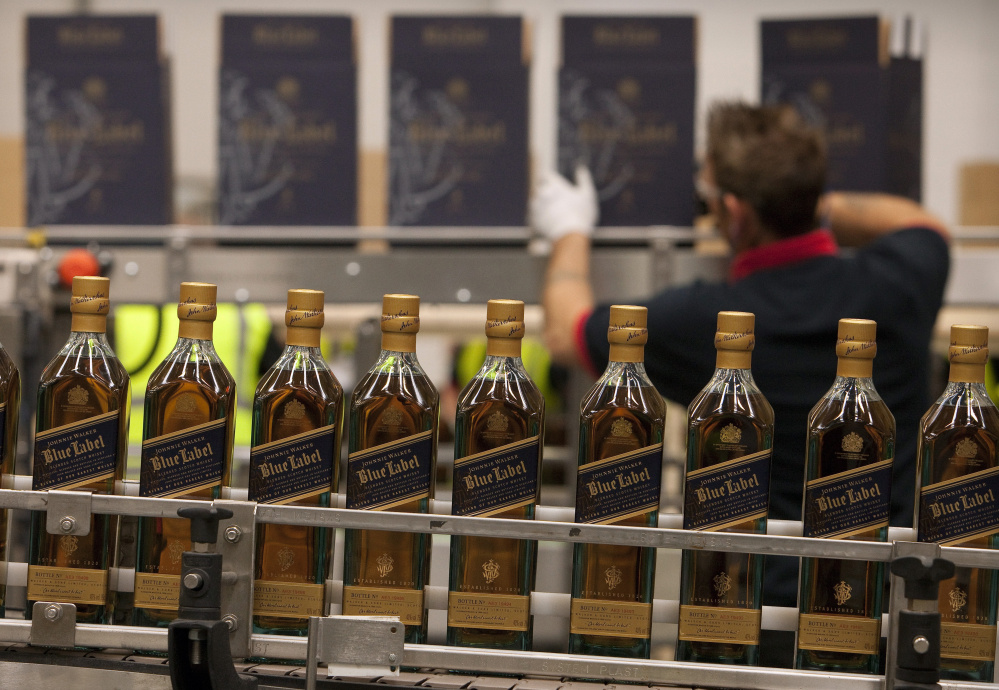Scotland lost the Brexit battle, but the vote to leave the European Union has been an unexpected boon for its whisky business.
A plunge in the pound after the June 23 EU referendum, which accelerated after the Bank of England cut interest rates Thursday, has lowered the price of scotch by 10 percent or more for overseas buyers. Whisky producers in Scotland, retailers in London and online merchants say they’re doing a roaring trade.
“It’s like Black Friday for whisky,” said Dawn Davies, who is in charge of buying at retailer The Whisky Exchange, referring to the busiest U.S. shopping day. Since the vote, “there’s been a crazy spike in sales – a 30 to 40 percent increase.”
It’s a welcome boost for Scotland, whose pro-EU voters were outnumbered by those in England and Wales who opted for leaving the bloc. Scotch is Britain’s largest food and drinks export, bringing in more than $5.3 billion a year, but overseas sales fell by 2.8 percent last year, hitting big producers like Johnnie Walker owner Diageo Plc and Chivas Regal parent Pernod Ricard SA.
Distillers lobbied against Brexit, saying the EU’s common market was vital to their business, but the weak pound has provided a silver lining since the vote. The improved outlook is reflected in Diageo’s share price, which has risen 19 percent since the referendum.
In recent years, many drinkers turned to trendier alternatives like Irish whisky or American bourbon and authorities in China – previously one of the biggest and fastest-growing markets – cracked down on expensive gift-giving.
SPRINGBANK 1919
At the Whisky Exchange shop in central London, which offers thousands of bottles stacked on six levels of shelves, the savings for shoppers with euros, dollars or yuan to spend are clear. A bottle of single-cask Arran 2000, which cost the equivalent of $105 on June 23, is now $93.18. Glen Grant 1968 has fallen to $646.11 from $728.16. The most expensive bottle in the shop, Springbank 1919, is down almost $9,000, at $72,254.
About 70 percent of the shop’s customers are tourists and the firm says it’s selling so many bottles it’s struggling to replenish its stock. Some tourists are buying whisky in the U.K. and selling it when they get back home, using online auction sites, retailers said. Others may be trying to lock in lower prices before they lose tariff-free access to U.K. exports – one possible consequence of Brexit.
The promise of savings is pushing consumers to the top shelf. At Milroy’s of Soho, a hole-in-the-wall shop that doubles as a bar, owner Martin Simpson says more expensive bottles have been flying out the door as customers take advantage of the exchange rate to try prized single malts.
650 CASKS
“The sales have totally shifted,” he said as he chatted with customers lined up at the bar. “Higher end bottles are more popular while the cheaper ones aren’t selling.”
Some producers have also seen an increase in orders as the pound has fallen. Adelphi Distillery, on the remote Ardnamurchan peninsula in the Scottish Highlands, makes just 650 casks available annually. Customers who didn’t get theirs this year will have to wait.
“We’re in the fortunate position of having all our whiskies already allocated,” said Alex Bruce, director of sales and marketing.
Diageo, which operates almost a third of Scotland’s distilleries, said scotch sales had improved even before the Brexit vote. In the year ended June 30 – including only one week of results since the referendum – volume held steady after a 5 percent decline a year earlier.
‘TOMORROW’S WHISKY’
In the spirit of a Scottish saying – “today’s rain is tomorrow’s whisky” – distillers are upbeat about their prospects as the U.K. negotiates its EU departure, even though the country risks losing tariff-free access to the EU.
Copy the Story LinkSend questions/comments to the editors.



Success. Please wait for the page to reload. If the page does not reload within 5 seconds, please refresh the page.
Enter your email and password to access comments.
Hi, to comment on stories you must . This profile is in addition to your subscription and website login.
Already have a commenting profile? .
Invalid username/password.
Please check your email to confirm and complete your registration.
Only subscribers are eligible to post comments. Please subscribe or login first for digital access. Here’s why.
Use the form below to reset your password. When you've submitted your account email, we will send an email with a reset code.